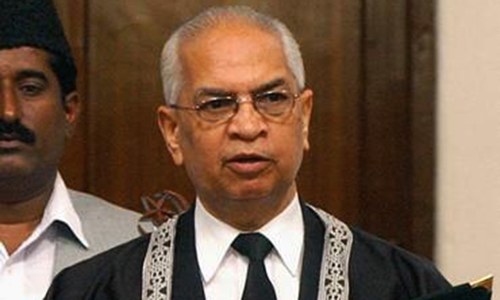Jurisprudence of Justice (r) Rana Bhagwandas Prithiani
BIOGRAPHY:
Rana Bhagwandas was born on 20th December 1942 into a Hindu Sindhi Rajput family in Naseerabad, Larkana District in Sindh. He studied Law and received a Master’s degree in Islamic Studies. He was a senior judge and former acting Chief Justice of the Supreme Court of Pakistan during the 2007 judicial crises when the incumbent Chief Justice Iftikhar Muhammad Chaudhry went on a foreign tour. He became the first Hindu and the third non-Muslim (after A.R Cornelius and Dorab Patel) to serve as the chief of the highest court of Pakistan. He was considered an expert on constitutional law[1]. He worked as the Chair of Federal Public Service Commission of Pakistan and was also a member of the selection board of the Sindh Madressatul Islam University Karachi.
In 1999, his appointment to the superior judiciary was challenged by a constitutional petition which argued for the appointment to be declared unconstitutional because of Baghwandas’ religion. The petition was rejected on the grounds that,
- the prescribed procedure was followed in his appointment; and
- he was a highly respected judge and constitutional expert, which should have been the focus for the purposes of the appointment.
He died on 23rd February 2015 in Karachi.
HONOURS:
On 8 February 2005, Chief Justice Rana Bhagwandas was honoured with Siropa (robe of honour) during his maiden visit to Harimandir Sahib in Amritsar, India.
The reason for choosing Rana Bhagwandas as a jurist was to know how he, being a Hindu, saw and implemented laws in Pakistan and what jurisprudence he created.
JURISPRUDENCE:
He was a believer in the sanctity of the Constitution of Pakistan and its legal system. Bhagwandas maintained that the “law was equal for all religious communities in Pakistan”[2]. While staunchly defending Pakistan’s society and legal system against charges of bias and suppression of minorities, Bhagwandas was also a vocal opponent of the practice of honour killings of women in provincial rural areas.
In an interview, when it was brought up that Bhagwandas was the first acting Chief Justice from amongst the minorities, he said that,
“For me it makes me no difference because I treat it (his position) as a sacred trust. It is the virtue of God, the Parmatma, the creator to do justice and we as judges merely act as his agents. I always seek guidance from the Creator so that we do not make a wrong judgment. We act without favour or fear, ill will or affection. For me it makes no difference.”
INDEPENDENCE OF JUDICIARY:
Bhagwandas, when talked about the independence of the judiciary, said that the judiciary played an important role in interpreting and applying the law, and adjudicating upon the controversies between citizens and the state. The judges, he said, must be free from the interference of executive and legislature.
The independence of judiciary is a cardinal feature of our Constitution. All rights and liberties will look like ornamental pieces in the Constitution if not enforced in true spirit by the courts. The judges will have to bring some changes in their approach and outlook. They must strike a balance between the two maxims (justice delayed is justice denied and justice hurried is justice buried)[3].
CASES:
Rana Bhagwandas passed some remarkable decisions in his life. Even being a non-Muslim he never discriminated against anyone on the basis of religion, caste or nationality.
- Justice Bhagwandas took strong notice of a kidnapping case involving a girl who was forced to be a prostitute for four years in Khyber Pakthunkhwa (formerly known as North-West Frontier Province)[4].
- In another case, he mentioned the doctrine of equality before the law[5] and also the doctrine of double jeopardy[6].
CONCLUSION:
It is unfortunate that a country ruled by dictators will always split into religious, ethnic and sectarian divides. Pakistan has a long and proud tradition of eminent jurists hailing from minority communities. I am glad that Justice Bhagwandas kept this tradition alive and even more proud that as a nation we have turned a corner and are once again forming a Pakistan for all Pakistanis. Justice Bhagwandas, recognized for his dedication to justice and equality, made efforts that provided the opportunity of expression to all without consideration of caste, creed, colour, ethnicity or religion.
———-
References:
[1] timesofindia.indiatimes.com/india/Hindu-judge-to-act-as-Pak-Chief-Justice/articleshow/966172.cms?referral=PM
[2] https://www.dawn.com/news/1035583
[3] https://www.supremecourt.gov.pk/ijc/articles/2/1.pdf
[4] Sue moto action on Sep 19, 2005
[5] PLD 2002 Supreme Court 46
[6] 2002 SCMR 93
The views expressed in this article are those of the author and do not necessarily represent the views of CourtingTheLaw.com or any other organization with which he might be associated.



Amazing! ????
Amazing!!*